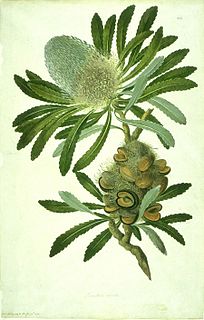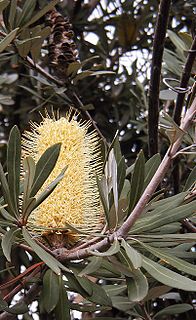Related Research Articles

Banksia subg. Banksia is a valid botanic name for a subgenus of Banksia. As an autonym, it necessarily contains the type species of Banksia, B. serrata. Within this constraint, however, there have been various circumscriptions.

As with other flowering plants, the taxonomy of Banksia has traditionally been based on anatomical and morphological properties of the Banksia flower, fruiting structure and seed, along with secondary characteristics such as leaf structure and growth habit. Increasingly, molecular evidence from DNA is providing important new insights into relationships within the genus and between this and other genera in the Proteaceae.

Banksia nutans, commonly known as nodding banksia, is a species of shrub native to the south coast of Western Australia in the genus Banksia. Growing to a metre (3 ft) tall, it has pale blue-green fine-leaved foliage and unusual purple-brown inflorescences which hang upside down rather than grow upright like most other banksias.

Banksia ser. Abietinae is a valid botanic name for a series of Banksia. First published by Carl Meissner in 1856, the name has had three circumscriptions.

Banksia ser. Salicinae is a valid botanic name for a series of Banksia. First published by Carl Meissner in 1856, the name has had three circumscriptions.

"The genus Banksia L.f. (Proteaceae)" is a 1981 monograph by Alex George on the taxonomy of the plant genus Banksia. Published by the Western Australian Herbarium as Nuytsia3(3), it presented George's taxonomic arrangement of Banksia, the first major taxonomic revision of the genus since George Bentham published his arrangement in Flora Australiensis in 1870.

Banksia ser. Cyrtostylis is a taxonomic series within the plant genus Banksia. First published at sectional rank by George Bentham in 1870, it was demoted to a series by Alex George in 1981. The name has had three circumscriptions.

Banksia ser. Banksia is a valid botanic name for a series of Banksia. As an autonym, it necessarily contains the type species of Banksia, B. serrata. Within this constraint, however, there have been various circumscriptions.
This is a timeline of developments in knowledge and understanding of the Australian plant genus Banksia:

George Bentham's taxonomic arrangement of Banksia was published in 1870, in Volume 5 of Bentham's Flora Australiensis. A substantial improvement on the previous arrangement, it would stand for over a century. It was eventually replaced by Alex George's 1981 arrangement, published in his classic monograph The genus Banksia L.f. (Proteaceae).
Carl Meissner's taxonomic arrangement of Banksia was published in 1856, as part of his chapter on the Proteaceae in A. P. de Candolle's Prodromus systematis naturalis regni vegetabilis. It was the first attempt to provide an infrageneric classification for the genus, aside from Robert Brown's publication of two subgenera in 1810. Meissner's arrangement stood until 1870, when it was superseded by the arrangement of George Bentham. Meissner's arrangement was an excellent survey of the known species at that time, but his infrageneric taxa were all highly heterogeneous.

Alex George's taxonomic arrangement of Banksia was the first modern-day arrangement for that genus. First published in 1981 in the classic monograph The genus Banksia L.f. (Proteaceae), it superseded the arrangement of George Bentham, which had stood for over a hundred years. It was overturned in 1996 by Kevin Thiele and Pauline Ladiges, but restored by George in 1999. A recent publication by Austin Mast and Kevin Thiele suggests that it will soon be overturned again.

Banksia subser. Longistyles is a valid botanic name for a subseries of Banksia. It was published by Kevin Thiele in 1996, but discarded by Alex George in 1999.

Banksia subser. Leptophyllae is a valid botanic name for a subseries of Banksia. It was published by Kevin Thiele in 1996, but discarded by Alex George in 1999.

Banksia subser. Sphaerocarpae is a valid botanic name for a subseries of Banksia. It was published by Kevin Thiele in 1996, but discarded by Alex George in 1999.

Banksia ser. Ochraceae is a valid botanic name for a taxonomic series within the plant genus Banksia. It was published by Kevin Thiele in 1996, but discarded by Alex George in 1999.

Banksia subser. Banksia is a valid botanic name for a subseries of Banksia. It was first used by Kevin Thiele in 1996, although as an autonym it is not considered to have been published per se. It was discarded by Alex George in 1999.

Banksia subser. Cratistylis is a valid botanic name for a subseries of Banksia. It was first published by Kevin Thiele in 1996 but discarded by Alex George in 1999.
References
- ↑ Bentham, George (1870). "Banksia". Flora Australiensis . Vol. 5: Myoporineae to Proteaceae. London: L. Reeve & Co. pp. 541–562.
- ↑ George, Alex S. (1981). "The Genus Banksia L.f. (Proteaceae)". Nuytsia . 3 (3): 239–473.
- 1 2 Thiele, Kevin; Ladiges, Pauline Y. (1996). "A Cladistic Analysis of Banksia (Proteaceae)". Australian Systematic Botany . 9 (5): 661–733. doi:10.1071/SB9960661.
- ↑ George, Alex S. (1999). "Banksia". In Wilson, Annette (ed.). Flora of Australia . Vol. 17B: Proteaceae 3: Hakea to Dryandra. Collingwood, Victoria: CSIRO Publishing / Australian Biological Resources Study. pp. 175–251. ISBN 0-643-06454-0.
- ↑ Olde, Peter; Neil R. Marriott (2002). "One new Banksia and two new Grevillea species (Proteaceae: Grevilleoideae) from Western Australia" (PDF). Nuytsia . 15 (1): 85–99. Archived from the original (PDF) on 2006-09-23. Retrieved 2007-01-10.